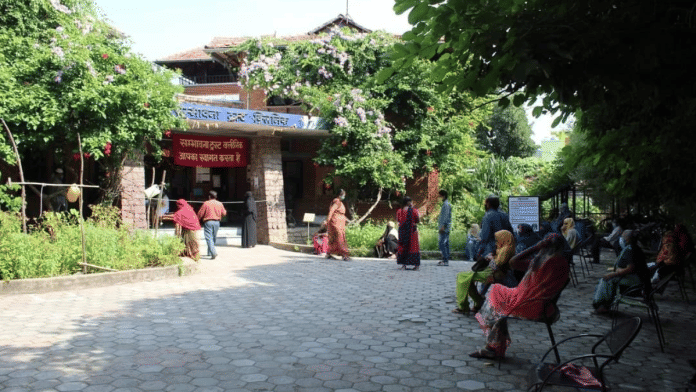New Delhi: Sanjay Saxena, 51, and thousands like him are on the brink of losing their lifeline as the Sambhavna Trust Clinic, which provides free specialised healthcare for more than two decades to the survivors of the Bhopal Gas tragedy, faces closure this year-end due to acute shortage of funds.
The 29-year-old institution has been a crucial support system for survivors of the 1984 Union Carbide disaster. Established in 1996, the clinic initially treated an average of 63 patients daily, a figure that grew to 92 by 2019. However, recent years have seen a decline, with the daily average dropping to 75 by 2024.
“An overwhelming majority of survivors suffer from long-term injuries affecting the respiratory, immunological, neurological, reproductive, endocrinal, musculoskeletal, and other systems,” explained Hari Prasad Joshi, managing trustee for the Sambhavna Trust. “The clinic requires Rs 20 lakh per month to sustain operations.”
In October 2019, the trust’s FCRA (Foreign Contribution Regulation Act) registration that was valid until October 31, 2021, was abruptly cancelled for alleged violation of FCRA rules, and its bank account was frozen by the Ministry of Home Affairs (MHA).
FCRA registration is a mandatory certification for organisations in India, enabling them to receive foreign contributions legally.
The trust was prohibited from applying for re-registration under the FCRA for three years and fined Rs 18 lakh. “The reason cited was the alleged failure to submit its Annual Report for 2017–18 by the 31 March 2019 deadline,” Joshi told ThePrint.
However, the MHA portal for filing the report was malfunctioning, making it impossible to upload the required documents, she added.
Despite sending emails to MHA officials with screenshots, proving the portal’s technical issues, the Sambhavna Trust claims to have received no acknowledgement. Subsequently, the trust paid the Rs 18 lakh fine and waited out the three-year ban.
ThePrint has access to the screenshots and the mail sent to the MHA and reached out to the MHA for a response via email but has not received any reply. This report will be updated as and when a response is received.
The trust, according to Joshi, applied for the FCRA re-registration on 2 February 2023. “While the portal promises a decision within three months, 22 months have passed and 65 percent of applications filed after Sambhavna have been processed. Yet, the trust’s application remains under process to this day,” the managing trustee added.
Beneficiaries and staff of the clinic formed the Union Carbide Poison Victims Healthcare Rights Front on 15 December. The following day, the group wrote to the Union Home Minister, requesting swift approval of the clinic’s FCRA registration. As of now, they are awaiting a response.
Over the years, the clinic built a strong donor base of 30,000 individuals across 45 countries, with annual spending growing from Rs 10.68 lakh in 1996 to Rs 2.5 crore in 2018. The UK-based Bhopal Medical Appeal spearheaded fundraising efforts, while the clinic relied on its FCRA registration to receive international donations. This system, according to Joshi, sustained the clinic for 23 years.
Fundraising efforts took a hit after the FCRA registration was canceled in 2019. Two compelling videos launched in 2019 on a crowdfunding platform failed, as potential donors struggled to believe survivors of the 1984 disaster still required medical care, four decades later. While long-term supporters contributed some funds, they were insufficient to keep operations fully afloat.
“Staff members took a 30 percent pay cut, and the clinic continued its work on a reduced budget, partially supported by the Azeem Premji Philanthropic Initiatives (APPI),” Joshi said.
Saxena has been a regular patient at Bhopal’s Sambhavna Trust Clinic since 2009, along with 14 other family members, some of whom have been receiving care for even longer.
He attributes his health issues to drinking water contaminated by the gas disaster. “I developed joint problems from consuming the contaminated water,” Saxena explained. “This led to neurological issues as well. I had jaundice, and later, blockages in the nerves of my waist and legs, causing severe joint pain. I still struggle to walk properly.”
He also suffers from blood pressure, diabetes, and thyroid-related conditions. “The treatments we received, like Panchakarma and yoga therapy, were very helpful. But with the clinic closing, it will be devastating for all of us, especially for my 74-year-old mother,” he told ThePrint.
Almost 30 yrs in service
Nearly three decades ago, the clinic, run by the Bhopal-based NGO Sambhavna Trust, (IS began its care provision with a holistic approach, integrating modern medicine, Ayurveda, yoga, and community health initiatives.
By October 2019, its services had expanded to include pathological investigations, ultrasound, gynecology, ophthalmology clinics, a herb garden and herbal medicine production unit, emergency and paramedic services, and community-based research.
Beyond its clinical work, the Sambhavna Trust Clinic extends its reach into the community with 40,000 community health workers serving a population of over 30,000 with health initiatives to combat malaria, dengue, and tuberculosis, and conducting early cervical cancer screenings.
Its community health surveys document long-term health challenges faced by more than 100,000 people.
The clinic serves the survivors and families of the gas leak that happened around midnight on 2 December, 1984, when approximately 40 tonnes of deadly Methyl Isocyanate gas leaked from a pesticide plant in Bhopal, owned by the US-based Union Carbide Corporation.
The toxic cloud rapidly claimed the lives of thousands living in informal settlements near the plant. To date, over 22,000 people are estimated to have died prematurely due to exposure, with fatalities continuing even decades later.
In addition, more than 500,000 individuals suffered injuries or long-term health complications. These include inter-generational impacts on reproductive health and contamination of water sources by chemicals abandoned at the site.
(Edited by Tony Rai)
Also Read: In 1st real-term drop since 2000, global health spends fell in 2022 after Covid-era rise—WHO report






